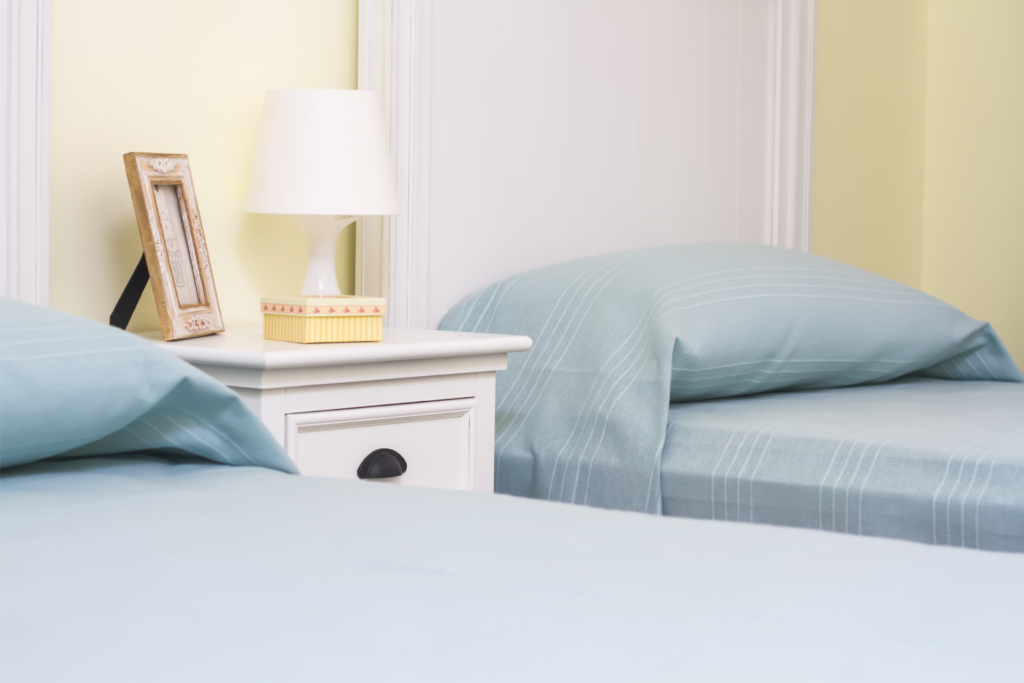Like other aspects of a relationship, sharing the bed can require a lot of compromises. Perhaps one partner sleeps hot while the other sleeps cold. Maybe your partner’s excessive snoring has finally beaten you, leading you to seek refuge in the family room. Maybe your partner goes to bed at 8 PM while you hit the hay hours later, walking on eggshells to avoid waking them up. As you silently tip-toe into bed you might be wondering, “should I go to bed at the same time as my spouse?”
The answer’s not as cut and dry as you might expect. Like many parts of your life, what you do depends entirely on your unique circumstances.
Nothing really compares to sharing a bed with your spouse or significant other. It’s a physically and emotionally intimate experience where you can discuss the events of your day, share pillow talk, and fall asleep together. That can be tricky to achieve if you both go to bed at different times though.
However, there are real benefits to going to bed at the same time as your intimate partner. Let’s look at those.
5 Benefits of Going to Bed at the Same Time as Your Spouse
According to the Sleep Foundation, 60 percent of American couples sleep together. You may be wondering about the other 40 percent— we’ll talk about this a little later.
Going to bed at the same time as your spouse can provide multiple physical and emotional health benefits. Here are 5 of them.
1. Intimacy
When you think about the benefits of sharing the bed with your significant other, physical intimacy is probably the first benefit that comes to mind.
Sharing a sleep schedule with your significant other helps build intimacy between you two. Not just sexual intimacy, but an emotional connection as well.
Laying in bed together encourages communication between partners, whether it’s discussing their worries or concerns, or just the day’s events.
2. It Releases Oxytocin
Sleeping with your partner releases oxytocin— also known as the “love” hormone. Oxytocin helps you feel happy and relaxed, and it can help lower your blood pressure too.
Oxytocin also helps encourage social bonding and developing a connection between two people. It’s not just between intimate partners either— oxytocin is also the hormone that helps new mothers bond with their babies. [2]
3. Helps Create Good Sleep Habits
Going to bed at the same time as your spouse can help you create healthy sleep habits, including:
- A consistent sleep schedule. When you and your partner go to bed at the same time, this can help eliminate bad habits that can harm your sleep quality. It can even help you both get more sleep each night.
- Can help improve REM sleep. One study has found that couples that fall asleep together experience better REM sleep than couples that do not. REM sleep is an important part of your sleep cycle where your brain works to recover from the previous day and help you prepare for the next. [3]
Related: Why We Sleep (And Why It’s So Important to Sleep Well)
4. It Gives You a Mental Health Boost
Spending time in bed with your partner— not just being asleep in bed— can help keep your mental health on the up and up.
Being in bed with your partner when bedtime rolls around can help reduce stress and anxiety, improve your self-esteem, and help increase communication between you and your partner.
5. Helps Regulate Your Body Temperature
Having another body in the bed can help keep you warm on a cold night— or warm in general, if you tend to sleep cold.
Your body uses a process called thermoregulation to help maintain its core temperature. This is what causes you to shiver when you’re cold, or sweat when you’re hot. Regulating your body temperature is vital to a good night’s sleep, because it helps prepare your body and your brain for a night of deep and restful sleep.
When Would A Couple Not Go To Bed At the Same Time?
There may be a number of reasons that you may go to bed at a different time from your spouse. This isn’t necessarily a bad thing, but untreated sleep disorders may be a root cause.
Here are three reasons why a couple may not go to bed at the same time.
1. Night Owl vs. Morning Lark
We can’t all be morning people. If you’re an early riser and your loved one is a night owl— or vice versa— this may complicate finding the perfect bedtime for you both.
2. Different Work Schedules
Different work schedules can mean different sleep schedules, especially if one person works nights or outside of the normal 9 to 5 work schedule.
If this is the case, then having the same bedtime as your spouse may just not be feasible if they have work the next day.
3. One Person’s Sleep Habits Disturbs the Other
Whether it’s because of snoring, tossing and turning, or other sleep problems, chances are everyone has gone to sleep in a different room from their partner at some point in the relationship.
Excessive snoring and sleep disturbances that force your partner to abandon the bed in the middle of the night could be a sign of an untreated sleep disorder, such as obstructive sleep apnea. Sleep apnea can be a strain on your long-term health and relationship.
If left untreated, poor sleep can cause daytime sleepiness, brain fog, or crabbiness, but it can also affect your body’s hormones— including your sex hormones. If your sleep habits are leaving your partner glassy-eyed and seeking refuge on the couch, it may be time to get tested for sleep apnea.
It can be stressful to go sleep in a separate room if your partner is keeping you up at night. Especially because there is, unfortunately, a lot of negative perception of each person sleeping in a separate bed. Sometimes though, that could be for the best.
What is a Sleep Divorce?
A sleep divorce may sound final or overwhelmingly negative, but sometimes this can save your relationship or marriage!
A sleep divorce is simply when you and your significant other sleep in separate bedrooms, separate beds, or at separate times. Believe it or not, this is actually a growing trend with many couples.
While it may feel like sleeping separately will harm your relationship, allowing resentment or anxiety to build over each other’s sleeping habits can do even more harm.
Are You and Your Spouse Strange Bedfellows?
There is no one secret to a healthy relationship. But when it comes down to it, compromise is one of the most important aspects of a loving relationship.
While there are some real benefits to sharing the bed with a loved one, you may also get better sleep if you sleep in a separate bed.
It all depends on your unique circumstances. Before you make a decision, make sure to talk with your partner, and possibly a sleep expert if you believe that a sleep disorder is causing your sleep problems.
A sleep specialist, like those at the Sleep Centers of Middle Tennessee, may recommend an overnight sleep study to evaluate your sleep patterns and determine the cause of your poor sleep.
Don’t let poor sleep ruin your relationship. Contact the Sleep Centers of Middle Tennessee today to schedule a consultation so you and your partner can sleep together in peace.
References
1. “Aging and Sleep: How Does Growing Old Affect Sleep?” Sleep Foundation, 18 Mar. 2022, www.sleepfoundation.org/aging-and-sleep.
2. Magon, Navneet, and Sanjay Kalra. “The Orgasmic History of Oxytocin: Love, Lust, and Labor.” Indian Journal of Endocrinology and Metabolism, Medknow Publications, Sept. 2011, www.ncbi.nlm.nih.gov/pmc/articles/PMC3183515/.
3. Drews, Henning Johannes, and Annika Drews. “Couple Relationships Are Associated with Increased REM Sleep-a Proof-of-Concept Analysis of a Large Dataset Using Ambulatory Polysomnography.” Frontiers, Frontiers, 1 Jan. 1AD, www.frontiersin.org/articles/10.3389/fpsyt.2021.641102/full.



